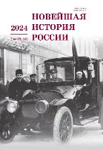Перерегистрация членов РКП(б) в 1918–1920 годах: по архивным материалам Вятской губернии
Re-registration of Members of the RCP(b) in 1918–1920: Based on Archival Materials of the Vyatka Region
Author(s): Yuri Nikolaevich TimkinSubject(s): Regional Geography, Political history, Pre-WW I & WW I (1900 -1919), Interwar Period (1920 - 1939), History of Communism
Published by: Издательство Исторического факультета СПбГУ
Keywords: Vyatka region; Communist Party; party; committees; re-registration; members; personnel policy;
Summary/Abstract: In 1918–1920 the Soviet state was taking its first steps in its formation and the Communist Party, faced serious difficulties in resolving personnel policy. Under the conditions of a change of power, people had new opportunities to increase their social status and improve their living conditions. It was the party member card that provided such opportunities. Therefore, it was necessary for the party to create a social filter that would allow, on the one hand, to prevent those who threatened the foundations of the new government from entering the power structures, and, on the other, to give the opportunity for promotion to those members who can become Soviet managers. Our article is devoted to the re-registration in 1918–1920, which served as the basis for the formation of the institution of purges later. The research was based on the principles of historicism, methods of historical institutionalism and case studies. The study revealed that at first there was no unified re-registration system, and the initiative in its implementation came from local organizations. The re-registration of 1919 was the first all-Russian campaign, the results of which remain, on the whole, ambiguous. Of course, it contributed to the cleansing of organizations from obvious opponents and criminals, but the lack of completeness of the archival material does not allow us to paint a full picture. The re-registration of 1920 was better organized and carried out. More than 2600 people left the provincial organization, which is almost 27 % of the total number of the organization. Moreover, almost 84 % were members, who evaded or did not appear and ignored this campaign. The re-registration commissions did not comment on this figure. Only few members were excluded. On the whole, both all-Russian re-registrations contributed much to the strengthening of discipline and solving conflict situations.
Journal: Новейшая история России
- Issue Year: 14/2024
- Issue No: 48
- Page Range: 619-635
- Page Count: 17
- Language: Russian

